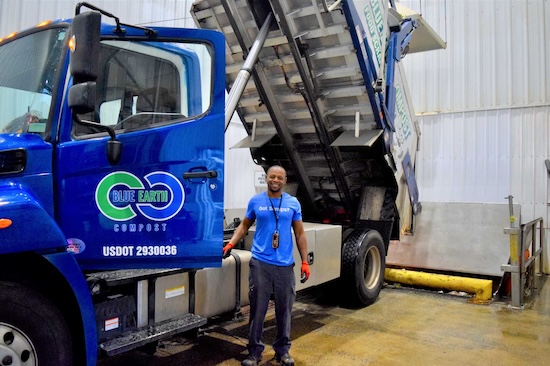
On a chilly morning last semester, Matar Rocker ’26 grabbed a shovel, some empty compost bins, and a pair of gloves.
“I like to get dirty,” she said.
Rocker, one of the University’s compost interns, helps manage compost collection on campus. Her role, driving an electric vehicle around campus to pick up food scraps, begins a long process that ends in electricity production.
As described in last week’s installment of “Tracking Wesleyan’s Waste,” with the closure of local waste-to-energy facilities, Connecticut sends 860,000 tons of trash out of state every year. In 2015, when Connecticut’s last state-wide waste assessment occurred, food waste accounted for 22% of total waste. Local sustainability teams hope that diverting food from the trash stream will help reduce the state’s waste crisis.
Since 2010, the University’s composting has grown steadily beyond just composting Usdan food scraps. Sustainability Director Jen Kleindienst explained, that for the first few years, students at Long Lane Farm attempted managing this composting process on campus in Earth Tubs.
“It was a giant tub with an auger that you turned—great in concept,” Kleindienst said. “We got them used from Trinity College, which should have been a good sign that they weren’t working super well.”
Materials aside, Kleindienst acknowledged the difficulty of the task on-site.
“Managing compost is a really tricky task because if you want to use it on food crops, you need to make sure it gets up to a particular temperature for a certain amount of time,” Kleindienst said, explaining that pathogens in meat and dairy might not break down properly otherwise.
In 2013, due to both the difficulty of on-campus management and the rising mass of compost, the University began outsourcing compost to Harvest New England, before switching to their current hauler, Blue Earth, in 2017.
A second composting service, 360 Recycling, based in Westfield, Mass., takes the University’s mixed compost consisting of greenware cutlery or containers, such as those from Pi Café.
In each of the past three years, the University has generated over 100 tons of compost, amounting to thousands of pounds a day, most of which came from Usdan University Center.
Contamination (Reduction) is Key
According to Kleindienst, contamination had been a problem for compost processing in the past.
“The biggest contamination issues were during COVID-19, because [Usdan food provider] Bon Appétit would order sets of compostable cutlery, and they would get sent plastic cutlery [instead],” Kleindienst said. “It took until probably last spring to get that resolved.”
Sam King, Chief Financial Officer at Blue Earth, agreed with Kleindienst’s assessment.
“We have seen an uptick in contamination since the pandemic [partly because of] the proliferation of single-use disposable items, compostable or not,” King wrote to The Argus. “In the interest of ‘health’ many dining operations moved from reusable and washable serving items to disposables. This has caused increases in contamination and an overall growth in waste. I’d really like to see more schools and other institutions move away from disposables.”
According to compost intern Olivia Benton ’25, the interns still bring the “cleanest” compost to Long Lane, where student farmers use it to enhance their planting soil.
Wesleyan Food Rescue student volunteers also work to divert food from the landfill. Since 2012, the group has delivered extra food from Usdan and Pi Café to the Eddy Shelter, an emergency shelter for adults and families in Middletown, according to current Director Imogen Frazier ’25. In 2023, they diverted 3,528 meals.
In Middletown proper, the city’s Sustainability Coordinator Kim O’Rourke met The Argus at the Transfer Station. There, the city collects drop-off compost, though only 1%–2% of the population participates, O’Rourke said.
To boost participation in food diversion, Middletown recently implemented a curbside pickup, where residents inside the sanitation district can buy special green bags from the City and place those inside their curbside trash bins. Like the University’s compost, Middletown sends its food scraps via Blue Earth Hauler to Quantum Biopower in Southington, Conn. Middletown pays Blue Earth $95.17 a ton, versus $124 a ton for trash, and varying rates for recycling, depending on the market.
At Quantum Biopower, an anaerobic digester blends food scraps with other organic materials to extract and capture methane gas, then convert it to electricity. Leftover by-products are used for compost. According to their website, the process converts 40,000 tons of organic waste a year, powering 800 Southington homes every hour.
Back in Middletown, the compost interns reflected on their composting experiences.
“I think all of us have grown up with a certain level of doom and gloom about climate change and environmental issues,” compost intern Devin Sturtevant ’25 said. “Working with compost and seeing this tangible impact is very motivating.”
“We all eat, and we all could create some nice food waste,” Rocker said. “In a literal sense, we can regrow.”
Thomas Lyons can be reached at tlyons@wesleyan.edu.



Leave a Reply